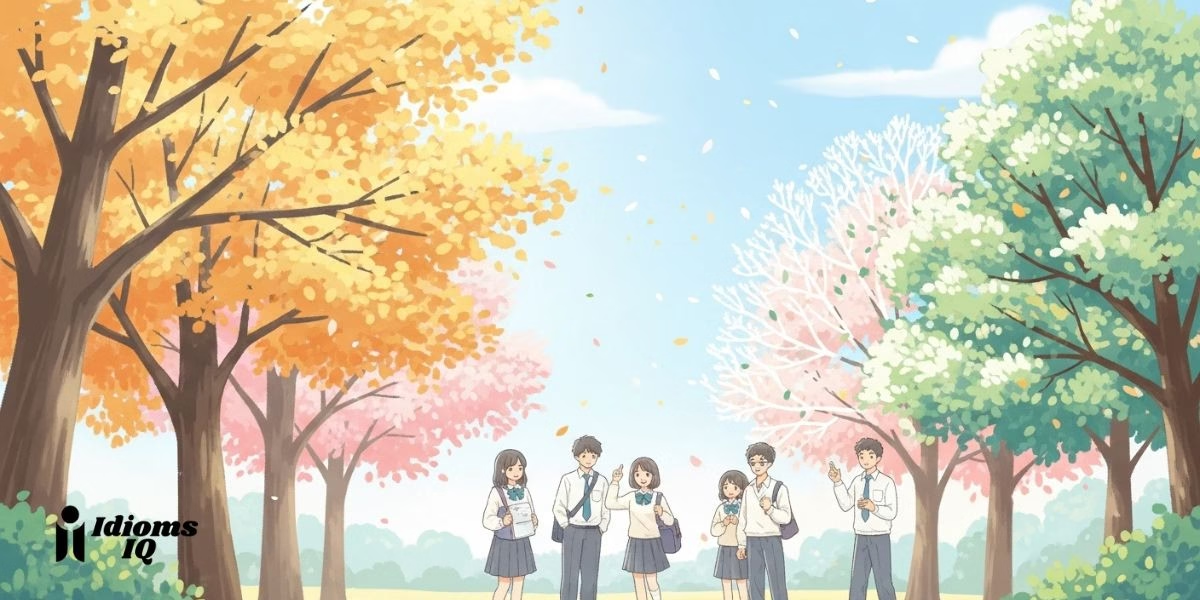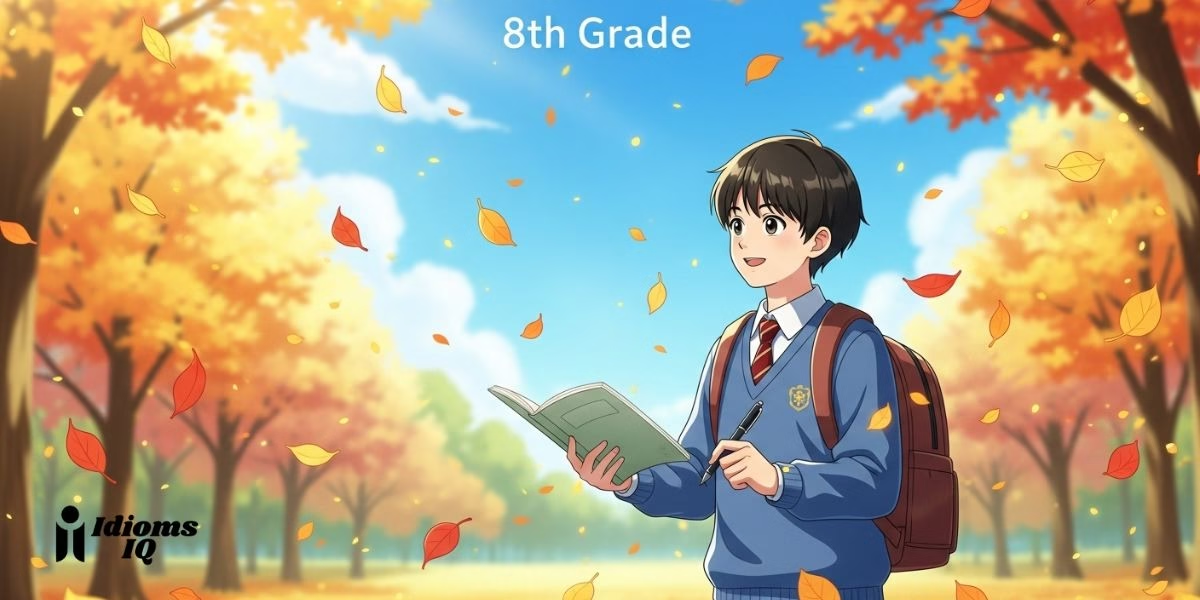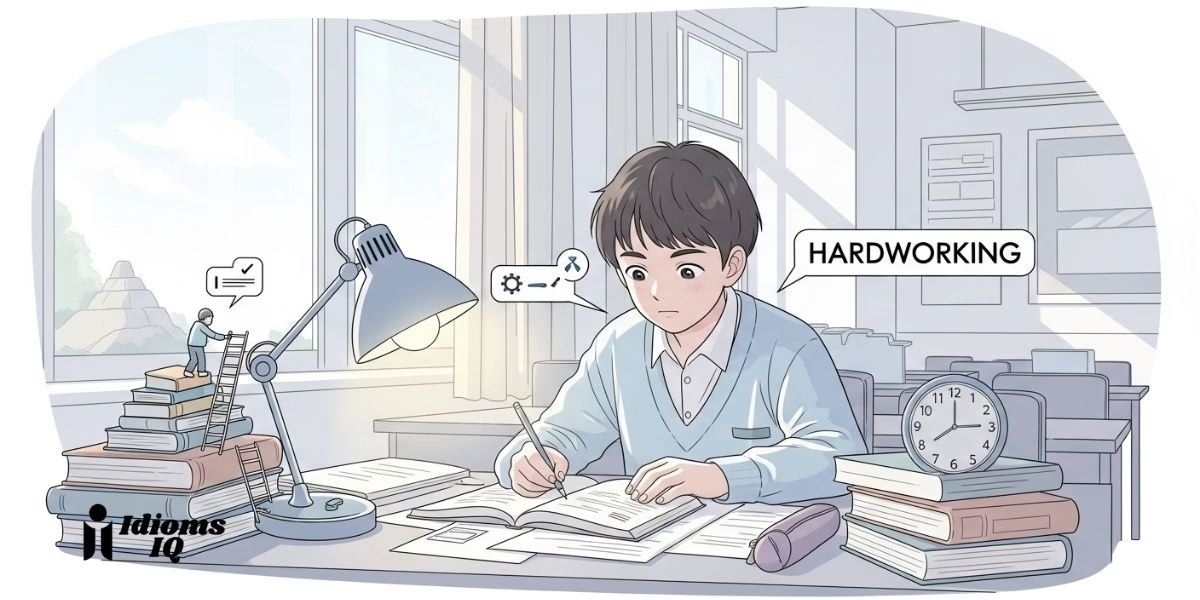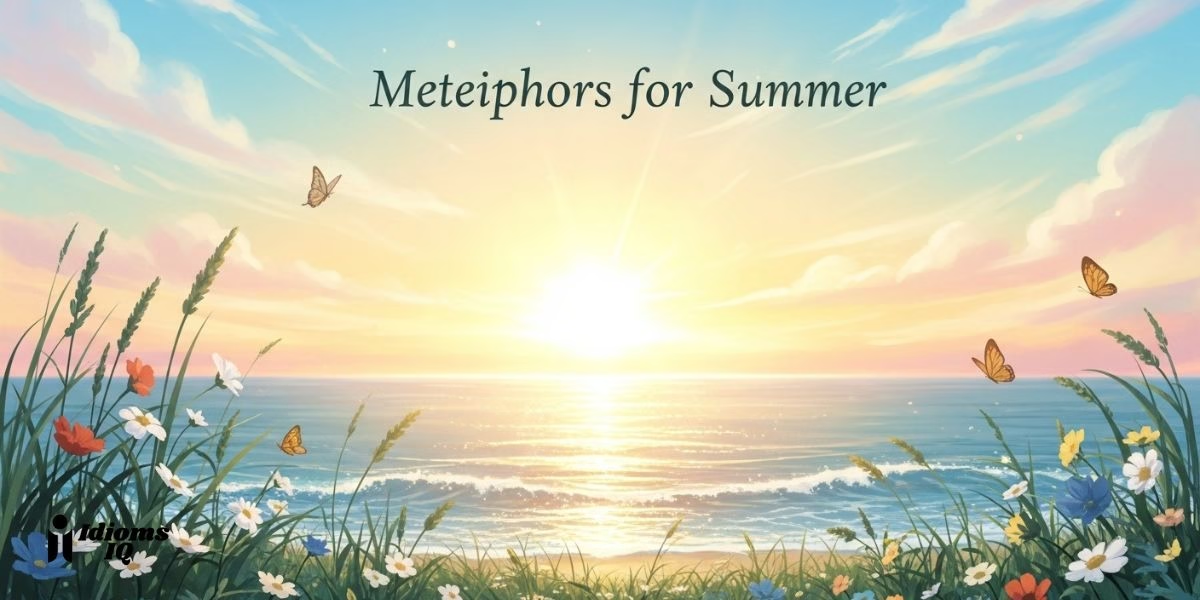
Autumn arrives with a unique and powerful feeling a mix of cozy comfort, stunning beauty, and a touch of gentle sadness. How do we capture this complex season in words? While we can list the colors and describe the crisp air, to truly express its soul, we turn to metaphors. A metaphor is a powerful figure of speech where we describe something by declaring it is something else, creating a rich image that speaks volumes.
Metaphors are the heart of creative expression, allowing us to connect abstract feelings to concrete ideas. When describing a season as emotionally layered as autumn, they are indispensable. This article explores 40 beautiful and evocative metaphors for autumn, complete with their meanings and examples, to help you see the season in a new light and articulate its magic with creativity.
Related: Metaphors for Happiness
Why We Use Metaphors for Autumn
Autumn is a season of transition and duality it is both a celebration of harvest and a preparation for the scarcity of winter; a blaze of glory and a process of decay. This complexity is hard to capture with literal language. Metaphors make these abstract themes tangible.
By calling autumn a “second spring” or a “gentle closing door,” we instantly convey a specific feeling and philosophy about the season. For artists and writers, these metaphors are crucial for setting a mood, evoking nostalgia, and transforming a simple description of falling leaves into a profound statement about life, beauty, and letting go.
Metaphors for Autumn
Here is a collection of metaphors that explore the rich and varied character of the fall season.
1. Autumn is a Second Spring
- Meaning: A time of rebirth and beauty, where every leaf is as vibrant as a flower.
- Usage Example: “With its brilliant colours and fresh energy, autumn is a second spring where every leaf is a flower.”
- This famous quote from Albert Camus reframes autumn as a season of beauty and life, not just decay.
2. Autumn is a Painter
- Meaning: The season is an artist that transforms the green landscape into a masterpiece of red, yellow, and orange.
- Usage Example: “Every year, autumn the painter arrives and sets the hills ablaze with colour.”
- This metaphor personifies the season, giving it creative agency and intention.
3. Autumn is the Evening of the Year
- Meaning: The final, beautiful, and peaceful part of the year before the “night” of winter.
- Usage Example: “As the days grew shorter, you could feel the evening of the year approaching.”
- This metaphor connects the cycle of a day to the cycle of the seasons, creating a sense of calm and closure.
4. Autumn is a Cozy Blanket
- Meaning: A season that brings a feeling of warmth, comfort, and security.
- Usage Example: “With its warm drinks and soft sweaters, autumn is a cozy blanket for the soul.”
- This metaphor focuses on the comforting and domestic aspects of the season.
5. Autumn is Nature’s Final, Brilliant Smile
- Meaning: The last burst of vibrant beauty and warmth before the cold of winter sets in.
- Usage Example: “The week of peak foliage was nature’s final, brilliant smile before the world turned grey.”
- This phrase, inspired by William Cullen Bryant, captures the bittersweet beauty of the season.
6. Autumn is a Bittersweet Symphony
- Meaning: A beautiful but sad composition of dying light, falling leaves, and cooling air.
- Usage Example: “The sound of the wind through the bare branches was part of autumn’s bittersweet symphony.”
- This auditory metaphor highlights the season’s blend of beauty and melancholy.
7. Autumn is a Harvest Queen
- Meaning: The season is a regal figure representing abundance, bounty, and the culmination of the year’s growth.
- Usage Example: “With her crown of golden leaves and cloak of plenty, autumn is the harvest queen.”
- This metaphor personifies autumn as a powerful, generous, and royal entity.
8. Autumn is a Time of Letting Go
- Meaning: The season is a physical manifestation of the process of releasing what is no longer needed.
- Usage Example: “Watching the leaves fall, she felt that autumn was a time of letting go of her own past hurts.”
- This connects the natural process of trees shedding leaves to a psychological or emotional one.
9. The Falling Leaves are Golden Rain
- Meaning: The leaves falling from the trees are as beautiful and precious as a shower of gold.
- Usage Example: “The children danced in the woods as a shower of golden rain fell around them.”
- This visual metaphor emphasizes the beauty and value of the falling leaves.
10. Autumn is a Whisper of Winter

- Meaning: The first chill in the air and early frosts are hints of the coming cold season.
- Usage Example: “The cold morning was a whisper of winter, a promise of the snow to come.”
- This metaphor frames autumn as a precursor or messenger for winter.
11. Autumn is a Treasure Chest of Colours
- Meaning: The season is a container filled with rich, valuable, and beautiful hues.
- Usage Example: “The forest in October is a treasure chest of colours, overflowing with gold, ruby, and amber.”
- This metaphor highlights the richness and preciousness of autumnal colours.
12. Autumn is a Slow Fire
- Meaning: The colours of the leaves create the appearance of a landscape that is smouldering or gently burning.
- Usage Example: “The maple forest was a slow fire, its colours deepening with each passing day.”
- This captures the dynamic and warm-toned visual progression of the season.
13. Autumn is a Patchwork Quilt
- Meaning: The landscape, with its varied blocks of colour, resembles a handmade quilt.
- Usage Example: “From the hilltop, the valley was a patchwork quilt of green, yellow, and red fields.”
- This metaphor evokes a sense of rustic charm, warmth, and handcrafted beauty.
14. Autumn is an Old Book
- Meaning: A season that evokes a sense of nostalgia, with a dry, papery scent and a feeling of history.
- Usage Example: “The smell of the dry leaves reminded him of a library; autumn was an old book full of memories.”
- This connects the sensory experience of fall with the intellectual and nostalgic act of reading.
15. Autumn is a Final, Warm Hug
- Meaning: The last period of pleasant, warm weather before the cold of winter.
- Usage Example: “The sunny seventy-degree day in late October was the year’s final, warm hug.”
- This personifies the season’s warmth, giving it an affectionate and comforting quality.
16. Autumn is the Artist of Decay
- Meaning: The season finds and creates beauty in the process of things breaking down and fading.
- Usage Example: “While spring builds, autumn is the artist of decay, finding beauty in rust and ruin.”
- This metaphor presents the process of decay not as ugly, but as an aesthetic transformation.
17. Autumn is a Deep Breath Before the Plunge
- Meaning: A moment of calm and preparation before the intense, challenging season of winter.
- Usage Example: “The crisp, still air of November felt like a deep breath before the plunge into winter’s snow.”
- This metaphor captures the feeling of anticipation and bracing for what’s to come.
18. Autumn is a Sleepy Cat Curled in the Sun
- Meaning: The season has a warm, lazy, and contented feeling.
- Usage Example: “The warm afternoon, with its soft light and gentle breeze, was a sleepy cat curled in the sun.”
- This charming metaphor personifies the mood of a perfect, calm autumn day.
19. Autumn is a Final Feast
- Meaning: The season represents the last celebration of abundance (harvest) before the lean times of winter.
- Usage Example: “Thanksgiving is the centerpiece of autumn, the year’s final feast before the world sleeps.”
- This connects the season to rituals of food, gratitude, and community.
20. Autumn is a Bridge to Winter

- Meaning: The season is a transitional period that connects the warmth of summer to the cold of winter.
- Usage Example: “September and October are a beautiful bridge to winter, making the transition gentle.”
- This metaphor emphasizes autumn’s role as a connector between two opposite seasons.
21. Autumn is a Glowing Ember
- Meaning: It is the last remnant of the year’s warmth and light, slowly fading but still beautiful.
- Usage Example: “The last red leaves clinging to the oak tree were a glowing ember against the grey sky.”
- This captures the beauty in the final stages of the season before it disappears completely.
22. Autumn is a Thoughtful Pause
- Meaning: A quiet, reflective time of year between the frantic activity of summer and the holidays.
- Usage Example: “After the busy summer, autumn was a thoughtful pause, a time to reflect and plan.”
- This metaphor frames the season as a period of introspection and calm consideration.
23. Autumn is a Rich Tapestry
- Meaning: It is a complex weaving of many different colours, textures, and moods.
- Usage Example: “The season is a rich tapestry of crisp air, golden light, and the scent of woodsmoke.”
- This highlights the multi-sensory and intricate nature of autumn.
24. Autumn is a Tired King
- Meaning: A once-powerful entity that is now old, beautiful in its decline, and ready to rest.
- Usage Example: “With its faded glory and golden crown, autumn is a tired king abdicating his throne to winter.”
- This personification gives the season a sense of dignity, history, and graceful decline.
25. Autumn is a Gentle Unravelling
- Meaning: The season is a slow, peaceful process of things coming undone.
- Usage Example: “Watching the world prepare for winter felt like a gentle unravelling of summer’s tight weave.”
- This metaphor describes the process of decay in a soft, non-violent way.
26. Autumn is a Storyteller
- Meaning: A season that evokes memories and prompts the sharing of stories, often around a fire.
- Usage Example: “With its long evenings and cozy atmosphere, autumn is a natural storyteller.”
- This metaphor connects the mood of the season with the human tradition of narrative.
27. The Wind is a Lonely Voice
- Meaning: The sound of the autumn wind is mournful and carries a sense of solitude.
- Usage Example: “He listened to the wind, a lonely voice singing a sad song through the trees.”
- This auditory metaphor gives the wind an emotional, human quality.
28. Autumn is a Migration
- Meaning: A time of movement, transition, and seeking shelter in preparation for a coming change.
- Usage Example: “Not just for the birds, autumn is a migration for the soul, a turning inward.”
- This metaphor applies the literal migration of animals to a psychological or spiritual shift.
29. Autumn is a Rehearsal for Winter’s Silence
- Meaning: The gradual quieting of the landscape is a practice for the deep stillness of winter.
- Usage Example: “The fading sounds of insects and birds were a rehearsal for winter’s silence.”
- This frames the diminishing sounds of fall as a preparation for what is to come.
30. Autumn is a Glass of Wine

- Meaning: The season is rich, complex, mature, and deeply coloured, meant to be savoured slowly.
- Usage Example: “A perfect autumn day, with its deep colours and mellow light, is a fine glass of wine.”
- This sophisticated metaphor connects the season to luxury, maturity, and sensory pleasure.
31. Autumn is a Magician
- Meaning: The season performs a magical trick, changing the green world to gold overnight.
- Usage Example: “We went to bed in summer and woke up to autumn; the season is a magician.”
- This captures the feeling of sudden, almost supernatural, transformation.
32. Autumn is a Golden Sigh
- Meaning: A final, beautiful release of warmth and life before the rest of winter.
- Usage Example: “The Indian summer was the year’s last golden sigh.”
- This personifies the entire season as a single, expressive, and slightly melancholy exhalation.
33. Autumn is a Gentle Closing Door
- Meaning: The season signifies the slow, peaceful end of the year’s vibrant phase.
- Usage Example: “Unlike the slamming door of a blizzard, autumn is a gentle closing door.”
- This metaphor emphasizes the graceful and non-violent transition into winter.
34. Autumn is a Rusty Key
- Meaning: The season unlocks memories and a sense of beautiful, aged nostalgia.
- Usage Example: “The smell of burning leaves was a rusty key, unlocking a door to his childhood.”
- This metaphor connects the aesthetic of autumn (rust colours) to its function as a trigger for memory.
35. Autumn is a Time of Inventory
- Meaning: A period for taking stock of the year’s accomplishments (the harvest) and preparing for the future.
- Usage Example: “For the farmer, autumn is a time of inventory, of counting the bushels and storing the grain.”
- This metaphor frames the season in practical terms of reflection and preparation.
36. Autumn is a Sleepy Giant
- Meaning: The land itself seems like a huge creature that is getting tired and ready for a long sleep.
- Usage Example: “With its slowing pulse and muted colours, the land in autumn is a sleepy giant.”
- This metaphor gives the entire landscape a single, gentle, and personified consciousness.
37. Autumn is a Memory
- Meaning: The season itself feels like a living memory of the summer that has just passed.
- Usage Example: “The warm sun on the cool breeze felt like a memory of summer.”
- This metaphor captures the nostalgic and reflective mood inherent in the season.
38. Autumn is a Burning Sunset
- Meaning: The season is the spectacular, fiery, and colourful end to the “day” of the year.
- Usage Example: “If summer is midday, then autumn is the long, burning sunset that precedes the night.”
- This extends the “evening of the year” metaphor with a more fiery and dramatic visual.
39. Autumn is a Quiet Friend
- Meaning: A comforting, undemanding presence that brings peace and solace.
- Usage Example: “After the loud parties of summer, the season was a quiet friend, perfect for long walks.”
- This personification highlights the gentle, companionable nature of autumn’s mood.
40. Autumn is a Final Flourish

- Meaning: The last, grand, and decorative gesture before the end.
- Usage Example: “The vibrant display of colour across the mountains was nature’s final flourish.”
- This metaphor frames the season’s beauty as a deliberate, artistic, and conclusive act.
Practice Your Skills: Fill in the Blanks
Ready to describe the season like a poet? Fill in the blanks with the most fitting metaphor for autumn from the list.
- The beautiful, warm weather in October felt like the year’s ________________.
- The forest was a ________________ of red and gold.
- The first frost on the pumpkins was a ________________, hinting at the cold to come.
- She loved the cozy feeling of the season, which wrapped around her like a ________________.
- Watching the leaves let go of the branches reminded her that autumn is a ________________.
- The brilliant colours across the hills made it seem like autumn was a master ________________.
- The gradual cooling of the air and shortening of the days felt like the ________________ of the year.
- The bounty of apples and pumpkins showed that autumn is a ________________.
- The mix of beautiful colours and sad farewells made the season a ________________.
- From the airplane, the multicoloured woods below looked like a ________________.
Answers
- final, warm hug
- treasure chest of colours
- whisper of winter
- cozy blanket
- time of letting go
- painter
- evening
- harvest queen
- bittersweet symphony
- patchwork quilt
Conclusion
Metaphors are the key to unlocking the true emotional depth of a subject as rich as autumn. They allow us to move beyond simple descriptions and into the realm of shared feeling and creative expression. By seeing autumn as a “storyteller,” a “cozy blanket,” or a “final, brilliant smile,” we connect with its core identity in a more profound way.
We encourage you to use this list not just to expand your vocabulary, but to look at the world around you with the eyes of an artist, finding your own metaphors to describe its beauty.






